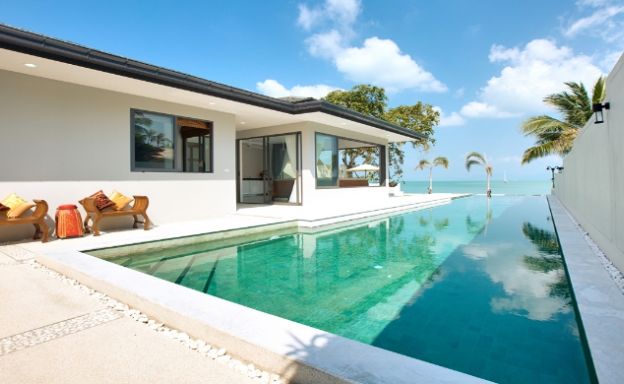Just after sunrise, Lisa and David set foot on the soft sands of Ao Nang beach in Krabi, Thailand. The couple had been traveling through Southeast Asia for months, but nothing compared to Thailand’s coastline’s tranquil beauty. Towering limestone cliffs framed the clear, turquoise waters while longtail boats floated in the distance. After a week of island hopping, they decided they didn’t just want to vacation here—they wanted to put down roots. Buying a beach house in Thailand had never crossed their minds until now, but as they sipped their morning coffee from a seaside café, they began to imagine a life filled with warm days, ocean breezes, and the laid-back culture that had captured their hearts. Little did they know they were not alone. Many foreigners were discovering the allure of Thailand’s beach house market, where luxury and affordability often go hand-in-hand. Thailand beach house for sale
Lisa and David’s story reflects a growing trend: more and more people worldwide are looking to purchase beach houses in Thailand, drawn by the country’s stunning natural beauty, affordable real estate, and vibrant culture. Whether it’s a modest beachfront bungalow on one of the quieter islands or a luxury villa overlooking the Andaman Sea, Thailand’s beach house market offers something for every type of buyer.
In this article, we’ll dive into the real estate market for beach houses in Thailand, explore why so many people are investing here, examine key trends and pricing, and offer insights into the buying process for foreigners.
Why Buy a Beach House in Thailand?
A Blend of Natural Beauty and Lifestyle Appeal
Thailand’s appeal as a beach house destination stems from its extraordinary natural beauty and relaxed, tropical lifestyle. The country boasts some of the most picturesque coastlines in the world, with beaches stretching across the Gulf of Thailand and the Andaman Sea. From the luxury resorts of Phuket to the tranquil shores of Koh Lanta and the bustling, beach-lined streets of Pattaya, Thailand offers a variety of environments to suit different lifestyles.
In addition to its scenery, Thailand’s relatively low cost of living makes it an attractive place for foreign investors. According to Numbeo, Thailand’s cost of living is 60% lower than in the United States, with real estate prices also significantly lower than in many Western countries. Whether buyers seek a vacation home, an investment property, or a retirement destination, Thailand offers a unique combination of affordability, lifestyle, and potential return on investment.
Rising Demand for Coastal Properties
Thailand’s real estate market, especially in coastal areas, has been growing steadily over the past decade, largely fueled by foreign investment. The Bank of Thailand reports that foreign nationals account for approximately 20% of all property transactions in popular tourist destinations like Phuket and Pattaya. With Thailand’s thriving tourism industry, beach houses are seen as personal retreats and lucrative investment opportunities, with many buyers renting out their properties when they aren’t using them.
PropertyGuru says the demand for beachfront properties in Thailand has increased by 15% annually in recent years, with more buyers looking at islands like Phuket, Koh Samui, and Krabi. These areas offer the perfect balance of developed infrastructure and serene environments, making them ideal for living and renting.
The Thailand Beach House Market: Stats and Key Trends
Pricing and Market Overview
Thailand’s beach house market offers something for every budget, from modest beach cottages to luxurious multi-million-dollar villas. As of 2023, the average price for a beach house in Thailand can vary widely depending on location, size, and amenities.
- Phuket: As Thailand’s most developed island, Phuket remains the most popular destination for foreign buyers. According to CBRE Thailand, the average price for a luxury beach house or villa in Phuket ranges from ฿30 million to ฿80 million (approximately $900,000 to USD 2.5 million). While this may seem expensive compared to other regions of Thailand, Phuket’s high-end real estate market is attractive to buyers looking for prime locations, top-notch amenities, and proximity to international airports.
- Koh Samui: Known for its tranquil atmosphere and laid-back vibe, it has become a hotbed for beachfront real estate investment. Prices here are more affordable than in Phuket, with beachfront properties typically selling for ฿15 million to ฿50 million (approximately $450,000 to USD 1.5 million), according to Dot Property Thailand. This makes Koh Samui an excellent option for those seeking luxury and affordability.
- Krabi: Located on the Andaman Sea, Krabi is known for its dramatic limestone cliffs and secluded beaches. It offers some of Thailand’s most affordable beachfront properties, with prices starting at ฿10 million (approximately USD 300,000). The more luxurious properties in areas like Railay Beach and Ao Nang can go up to ฿40 million ($1.2 million USD), but there are plenty of more budget-friendly options in less touristy areas.
- Pattaya: For those looking for a more urban beach lifestyle, Pattaya, located a few hours from Bangkok, offers vibrant nightlife and affordable beachfront properties. As per FazWaz Thailand, beachfront homes in Pattaya range from ฿8 million to ฿25 million ($240,000 to USD 750,000), making it one of the more budget-friendly locations.
Foreign Ownership in Thailand: What Buyers Should Know
Legal Framework for Foreign Buyers
One key challenge for foreign buyers looking to purchase property in Thailand is the country’s legal restrictions on foreign ownership of land. Under Thai law, foreigners are not permitted to own land outright. However, several workarounds allow non-Thai nationals to own beach houses.
- Condominium Ownership: Foreigners can own up to 49% of the units in a condominium building. Buying a beachfront condo in Thailand is a popular option for foreign investors who want direct ownership without navigating complex legal structures.
- Leasehold Agreements: One of the most common ways foreigners own property in Thailand is through long-term leasehold agreements. These leases typically run for 30 years and can often be renewed. This allows buyers to effectively control the property without technically owning the land for a significant period.
- Thai Company Ownership: Some foreign buyers choose to set up a Thai company holding a 49% stake, while Thai nationals own the remaining 51%. The company can then purchase the property, allowing the foreigner indirect control. However, it is crucial to work with a local lawyer when pursuing this option to ensure compliance with Thai law.
Additional Costs and Considerations
Beyond the purchase price of a beach house, buyers must account for additional costs, including:
- Transfer Fees: Typically, transfer fees are 2% of the property value and are paid to the Land Department during the property registration process.
- Taxes: Buyers should know property and income taxes when renting their beach house. The property tax rate is usually 0.01% to 0.5% of the appraised value, depending on the use of the property (residential vs. commercial).
- Maintenance and Management Fees: For those purchasing within a gated community or resort development, management fees typically apply, which cover maintenance, security, and shared facilities like pools or gyms.
The Investment Potential of Thailand Beach Houses
Rental Income and ROI
The potential for rental income is a significant consideration for those not using their beach house year-round. Thailand is a top global tourist destination, and short-term vacation rentals can be highly lucrative, particularly in popular areas like Phuket, Koh Samui, and Krabi. According to Airbnb data, vacation homes in Thailand’s top tourist spots can generate annual rental incomes ranging from ฿500,000 to ฿3 million ($15,000 to USD 90,000), depending on the property’s location, size, and seasonality.
Rental yields in Thailand’s coastal areas are typically around 5-7%, higher than in many European and U.S. markets. With tourism steadily recovering post-pandemic, investing in a beach house in Thailand offers strong potential for both personal use and rental income.
Conclusion: Is a Thailand Beach House Right for You?
Owning a beach house in Thailand is more than just a real estate transaction—it’s an investment in a new lifestyle. Whether you’re drawn to a peaceful retreat in Koh Samui, a luxury villa in Phuket, or an affordable beachfront home in Krabi, Thailand’s real estate market offers something for every type of buyer. The country’s natural beauty, relatively cheap property prices, and rental potential make it an attractive destination for those seeking a personal getaway and a sound investment.
While there are legal and financial considerations to navigate, especially for foreign buyers, working with a reputable local real estate agent and lawyer can make the process smooth and rewarding. For those looking to make Thailand’s beaches their home, now is the perfect time to explore the market and find your slice of paradise.






